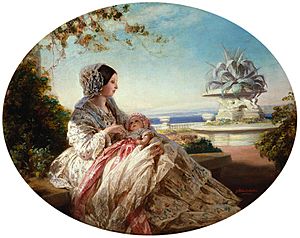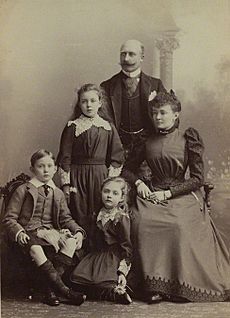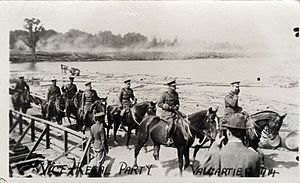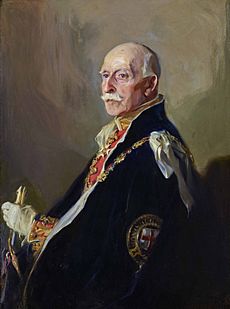Prince Arthur, Duke of Connaught and Strathearn facts for kids
Quick facts for kids Prince Arthur |
|||||
|---|---|---|---|---|---|
| Duke of Connaught and Strathearn | |||||
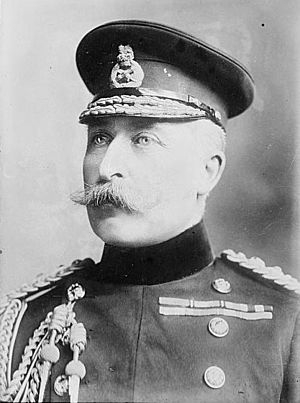
Prince Arthur in 1907
|
|||||
| 10th Governor General of Canada | |||||
| In office | 13 October 1911 – 11 November 1916 | ||||
| Predecessor | The Earl Grey | ||||
| Successor | The Duke of Devonshire | ||||
| Monarch | George V | ||||
| Prime Ministers | |||||
| Born | 1 May 1850 Buckingham Palace, London, England |
||||
| Died | 16 January 1942 (aged 91) Bagshot Park, Surrey, England |
||||
| Burial | 23 January 1942 Royal Vault, St George's Chapel, Windsor Castle 19 March 1942 Royal Burial Ground, Frogmore |
||||
| Spouse |
Princess Louise Margaret of Prussia
(m. 1879; died 1917) |
||||
| Issue |
|
||||
|
|||||
| House | Saxe-Coburg and Gotha (until 1917) Windsor (from 1917) |
||||
| Father | Prince Albert of Saxe-Coburg and Gotha | ||||
| Mother | Queen Victoria of the United Kingdom | ||||
| Military career | |||||
| Service/ |
|||||
| Years of service | 1868–1942 | ||||
| Rank | Field Marshal | ||||
| Unit | Royal Engineers Royal Regiment of Artillery Rifle Brigade |
||||
| Commands held | Inspector-General of the Forces Commander-in-Chief, Ireland Third Army Corps Aldershot Command Southern Command Bombay Army |
||||
| Battles/wars | Fenian Raids Anglo-Egyptian War | ||||
| Awards | Volunteer Officers' Decoration Territorial Decoration |
||||
Prince Arthur, Duke of Connaught and Strathearn (born May 1, 1850 – died January 16, 1942) was a son of Queen Victoria and Prince Albert. He was their seventh child and third son. Prince Arthur is famous for being the tenth Governor General of Canada. He was the only British prince to hold this important position.
Arthur was taught by private teachers at home. When he was 16, he joined the Royal Military Academy in Woolwich. After graduating, he became a lieutenant in the British Army. He served in the army for about 40 years, in different parts of the British Empire. During this time, he also became a Duke, known as the Duke of Connaught and Strathearn. He was also given the title of Earl of Sussex.
In 1911, Prince Arthur became the Governor General of Canada. He took over from Albert Grey, 4th Earl Grey. He stayed in this role until 1916. He was the King's representative in Canada during the first years of World War I. After his time in Canada, Arthur returned to the United Kingdom. He continued to do royal duties and military work. He retired from public life in 1928 but remained involved with the army until his death in 1942. He was Queen Victoria's last surviving son.
Contents
Early Life and Education
Arthur was born at Buckingham Palace in London on May 1, 1850. His parents were Queen Victoria and Prince Albert. He was baptized on June 22 in the palace's private chapel. His godparents included Prince William of Prussia and the Duke of Wellington. He was named after the Duke of Wellington, as they shared a birthday.
Like his older brothers, Arthur was taught by private teachers at home. It was said that he was Queen Victoria's favorite child.
Military Career and Service
Arthur showed an interest in the army from a young age. In 1866, he joined the Royal Military College at Woolwich. He graduated two years later. On June 18, 1868, he became a lieutenant in the Corps of Royal Engineers. He later joined the Royal Regiment of Artillery and then the Rifle Brigade. This was his father's own regiment.
Arthur had a long and successful career as an army officer. He served in many places, including South Africa, Canada, Ireland, Egypt, and India.
Service in Canada
In 1869, Arthur served in Canada with the Rifle Brigade in Montreal. His job was to help defend Canada from the Fenian Raids. Some people worried that his involvement might put him in danger. However, it was decided that his military duty came first. After arriving in Halifax, Arthur traveled around Canada for eight weeks. He also visited Washington, D.C., where he met with President Ulysses S. Grant.
During his time in Canada, Arthur was also involved in social events. He attended balls, garden parties, and the opening of parliament in Ottawa. He was the first member of the royal family to do this. On May 25, 1870, he helped fight off Fenian invaders during the Battle of Eccles Hill. For this, he received the Fenian Medal.
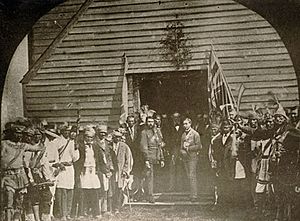
Prince Arthur made a good impression on many Canadians. On October 1, 1869, the Iroquois of the Grand River Reserve in Ontario gave him the title Chief of the Six Nations. They also gave him the name Kavakoudge. This name means "the sun flying from east to west under the guidance of the Great Spirit". This honor allowed him to join the tribe's councils and vote on important matters. He became the 51st chief, which was a special exception to their long-standing tradition of only 50 chiefs.
Later Military Ranks
Arthur was promoted to honorary colonel on June 14, 1871. He became a colonel on May 29, 1880, and a general on April 1, 1893. He gained more military experience as Commander-in-Chief of the Bombay Army from 1886 to 1890. He also commanded the Southern District at Portsmouth from 1890 to 1893.
Arthur hoped to become the Commander-in-Chief of the British Army in 1895. However, this wish was not granted. Instead, he commanded the Aldershot District Command from 1893 to 1898.
He was appointed Colonel-in-Chief of the Rifle Brigade in 1880. In 1900, a Canadian regiment in Vancouver, British Columbia, was renamed the 6th Regiment, Duke of Connaught's Own Rifles (DCORs) in his honor. He became its colonel-in-chief in 1923 and held this role until his death.
On June 26, 1902, he was promoted to field marshal. He then held other important positions. These included Commander-in-Chief of Ireland from 1900 to 1904. He was also Inspector-General of the Forces from 1904 to 1907.
Family Life and Titles
On May 24, 1874, Arthur was given the title of royal peer. He became the Duke of Connaught and Strathearn and Earl of Sussex. Later, he had a chance to inherit the Duchy of Saxe-Coburg and Gotha in Germany. This happened after his nephew died in 1899. However, Arthur decided to give up his and his son's right to this duchy. It then passed to another nephew.
On March 13, 1879, Arthur married Princess Louise Margaret of Prussia at St. George's Chapel in Windsor Castle. She was the daughter of Prince Frederick Charles of Prussia.
The couple had three children:
- Princess Margaret Victoria Charlotte Augusta Norah (born 1882 – died 1920)
- Prince Arthur Frederick Patrick Albert (born 1883 – died 1938)
- Princess Victoria Patricia Helena Elizabeth (born 1886 – died 1974)
Their children grew up at their country home, Bagshot Park, in Surrey. After 1900, they also lived at Clarence House in London. Through his children's marriages, Arthur became the father-in-law of Crown Prince Gustaf Adolf of Sweden. His first two children, Margaret and Prince Arthur, died before him.
Royal Duties and Public Service
Besides his military career, the Duke also carried out many royal duties. He represented the monarchy across the British Empire. In 1890, he toured Canada again with his wife. They stopped in all the major cities. He also toured Canada in 1906.
In January 1903, the Duke and Duchess represented the new King Edward VII at the Delhi Durbar in India. This event celebrated the King's new role. On their way to India, they visited Egypt. There, the Duke opened the Assuan dam on December 10, 1902.
In 1910, Arthur traveled to South Africa. He opened the first parliament of the newly formed union. In Johannesburg, he laid a special stone at the Rand Regiments Memorial. This memorial honored British soldiers who died during the Second Boer War.
Prince Arthur was also a Freemason. He was chosen as Grand Master of the United Grand Lodge of England in 1901. He was re-elected many times until 1939.
Governor General of Canada
On March 6, 1911, it was announced that King George V had approved Arthur's appointment as Governor General of Canada. This meant Arthur would be the monarch's representative in Canada. His brother-in-law, the Duke of Argyll, had also been Governor General. However, Arthur was the first member of the British royal family to hold this position. He was sworn in on October 13, 1911, in Quebec.
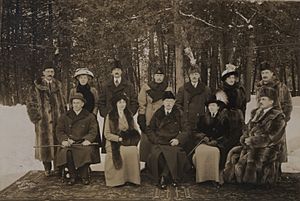
Arthur brought his wife and youngest daughter to Canada. His daughter became very popular with Canadians. The Governor General and his family traveled across the country. They performed important duties, like opening parliament in 1911. In 1917, Arthur laid a cornerstone at the newly rebuilt Centre Block on Parliament Hill. This was the same cornerstone his older brother, King Edward VII, had set in 1860. The family also visited the United States in 1912, where Arthur met President William Howard Taft.
When in Ottawa, Arthur spent four days a week at his office on Parliament Hill. He held small, private meetings with politicians and important guests. The Duke learned to ice skate and hosted skating parties at Rideau Hall. This was the royal and viceroyal residence. The Connaughts made many improvements to Rideau Hall during Arthur's time there. The royal family also enjoyed camping and outdoor sports like hunting and fishing.
In 1914, World War I began. Canadians were called to fight against Germany and Austria-Hungary. Arthur remained in Canada after the war started. He stressed the importance of military training for Canadian troops going to war. He also created the Connaught Cup for the Royal North-West Mounted Police. This encouraged recruits to practice pistol shooting. He was also active in war charities and visited hospitals.
Arthur's term as Canada's Governor General ended in 1916. After the war, Arthur commissioned a stained glass window for St. Bartholomew's Church, Ottawa. This window was in memory of Canadians who died in the war. The family regularly attended this church.
Later Life and Death
After his years in Canada, the Duke did not hold similar public offices. However, he continued to take on many public engagements. In 1920, he traveled to South Africa to open Chapman's Peak Drive. The next year, he went to India. There, he officially opened the new Central Legislative Assembly and other important government bodies. As president of the Boy Scouts Association, he opened the 3rd World Scout Jamboree at Arrowe Park.
The Duke also returned to military service. He continued to be involved well into the Second World War. He was seen as a grandfather figure by new recruits. His wife, the Duchess, had died in March 1917. Arthur mostly retired from public life in 1928. His last official event was opening the Connaught Gardens in Sidmouth, Devon, in 1934.
Prince Arthur died on January 16, 1942, at Bagshot Park. He was 91 years old. A funeral service was held at St George's Chapel, Windsor Castle on January 23. His body was later reburied on March 19, 1942, in the Royal Burial Ground, Frogmore. He was Queen Victoria's last surviving son.
Titles, Honours, and Arms
Prince Arthur held many titles and honors throughout his life. He was a member of the royal family and a viceroy. He also received many awards from both his own country and other nations. He was an active military member and eventually became a Field Marshal. He also served as a personal aide-de-camp to four different kings and queens.
Arms
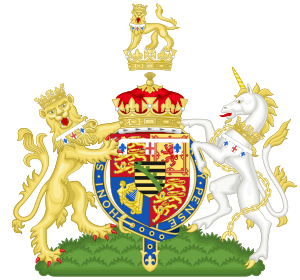 |
|
Children
| Image | Name | Birth | Death | Notes |
|---|---|---|---|---|
 |
Princess Margaret of Connaught | 15 January 1882 | 1 May 1920 | Married Crown Prince Gustaf Adolf of Sweden on June 15, 1905. They had children. Her grandchildren include King Carl XVI Gustaf of Sweden, Queen Anne-Marie of Greece and Queen Margrethe II of Denmark. |
 |
Prince Arthur of Connaught | 13 January 1883 | 12 September 1938 | Married Princess Alexandra, 2nd Duchess of Fife on October 15, 1913. They had children. |
 |
Princess Patricia of Connaught | 17 March 1886 | 12 January 1974 | Married Captain Sir Alexander Ramsay on February 27, 1919. She gave up her royal title and became Lady Patricia Ramsay. They had children. |
Images for kids
See also
 In Spanish: Arturo de Connaught (1850-1942) para niños
In Spanish: Arturo de Connaught (1850-1942) para niños
- British prince
- Royal dukedoms in the United Kingdom
Named in his honour:
- Port Arthur, a former city in Northern Ontario, Canada
- Connaught, a neighborhood in Calgary, Alberta, Canada
- Connaught Drive, Singapore
- Connaught Place, New Delhi, a major shopping area in India's capital
- Connaught Place, London, near Marble Arch and Hyde Park in London
- Connaught Road, Hong Kong, a main road on Hong Kong Island
- Connaught Square, Charlottetown, Prince Edward Island, Canada
- Rue Prince-Arthur, a street in Montreal, Canada, partly a pedestrian area
 | Stephanie Wilson |
 | Charles Bolden |
 | Ronald McNair |
 | Frederick D. Gregory |


